Join our network of over 200+ hotels growing their direct revenue online. Get Started
Join our partner networks of over 200+ hotels. Get Started
View what our clients say about us. Testimonials
In an increasingly connected world, the line between the online and offline spheres has never been more blurred.
As a hotelier, you’ve probably realized that the key to success in today’s hospitality landscape goes beyond offering comfortable beds and a warm breakfast.

It’s about creating an unforgettable experience that starts long before your guests walk through your doors, and that’s where local SEO (local search engine optimization) and online reputation management comes in.
Your hotel’s local search results has the power to shape your guests’ perceptions and expectations, and mastering this art is essential to standing out in a sea of choices.
Imagine if travelers searching for a place to stay in your area could find your hotel website at the top of their search results, accompanied by glowing reviews and compelling images.
That’s the magic of local search engine optimization and effective online reputation management.
In this article, we’ll delve into the world of local SEO, unearthing the strategies that can propel your hotel to the forefront of local search results, making it the go-to choice for guests looking for an amazing stay.
We’ll also explore the art of managing your online reputation, turning guest reviews and ratings into powerful tools that will not only attract more guests but also help you continually improve your offerings.
So, buckle up, and let’s embark on this journey together to enhance your hotel’s online presence and create a digital experience that is truly remarkable.
Local SEO (search engine optimization) helps people find your hotel when they search for a place to stay in your area.

With focused, targeted keyword research, you can make sure local content on your hotel website appears at the top of results for search engines.
To make your hotel stand out, you need to work on your Google My Business listing, use local keywords on your website, and connect with local businesses and websites.
Doing this will help your hotel become more popular online.
Online reputation management is about making your hotel look good by keeping track of and responding to guest reviews and ratings. This means answering both good and bad feedback and using it to make your hotel better.
Having a good online reputation will bring more guests to your hotel and make people trust you more.
Both local SEO and online reputation management work together to make your hotel more popular online.
By using these ideas, you can make your hotel stand out and create a great experience for your guests. This will help your hotel grow and become more successful.
In the next part, we’ll talk about ways to help your hotel show up better in search results and how to use guest reviews to make your hotel even better.
Any good local SEO for hotels strategy starts with implementing your Google Business Profile (formerly “Google My Business”). you can find plenty of guides for getting this set up online, but here’s a brief overview.

First, follow the steps on the Google Business Profile website. Once you’re there, search for your own hotel property’s name.
If you see it, click on it, and follow the steps to show that you’re the owner. This is like telling Google, “Hey, that’s my hotel!”
If it’s not there, you can just add it manually. You’ll need to have access to the business’ phone number or listed email address to verify ownership of the establishment.
You can always do this later, but your listing will not be posted until you verify.
Now, you need to make sure your hotel’s information is correct.
Check the address, phone number, and website to be sure they’re right. Also, be sure to add information like the hours your hotel is open and brief description of the establishment.
Finally, you need to show people how cool your hotel is!
Take some professional pictures and videos of your hotel, like the rooms, the lobby, and anything else that looks fun and sets you apart from local listings.
Then, upload them to your Google Business Profile. Think of this like posting pictures from your last vacation, generating a fear of missing out will encourage patrons to stay at your hotel.

Using the right words on your hotel website is like having a secret code that helps people find you online.
Local SEO for hotels is all about making sure you use the right words or phrases (called keywords) that help your hotel stand out when people search for places to stay in your area.
In this section, we’ll talk about how to conduct keyword research to make your hotel more popular online. Let’s cover the basics:

First, you need to discover which words or phrases your target audience use when looking for hotels like yours.
To do this, think about what makes your hotel special and what people might search for. This is keyword research.
For example, if your hotel is near a famous park, people might search for “hotel near [park name].”
You can also use tools on the internet to help you find more keywords that are popular in your area. You can use powerful free tools like answerthepublic.com and alsoasked.com.
Professional web design agencies will use professional tools like ahrefs or Moz to do this. If you have the time and staff to dedicate to this task, it could pay dividends to your hotel website.
The important thing is to understand your target audience and what they use Google search for.

Once you have a list of keywords, it’s time to use them on your website.
Add these words or phrases to different parts of your site, like in the text on your homepage, in the descriptions of your rooms, or even in your blog posts.
Make sure all the keywords fit your on-page SEO naturally and don’t overdo it. Also, be sure you add the keywords to your site’s meta tags.
Meta tags are special codes on your website that tell search engines like Google what your site is about.
An easy way to get your hotel website ranking in Google and search engine results is to always follow SEO best practices for your meta description:

By following these best practices, you’ll create effective meta descriptions that can improve click-through rates and boost your website’s SEO performance.
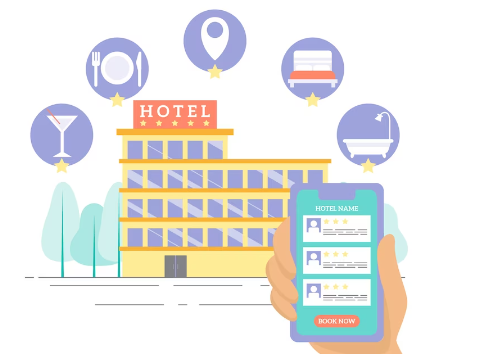
Building local citations and backlinks helps your hotel become more popular on the internet, which can lead to more people finding and staying at your hotel.
This is the process of building off-page SEO, that is SEO that’s not on your hotel website.
Let’s learn about how to create these connections and make your hotel stand out online.
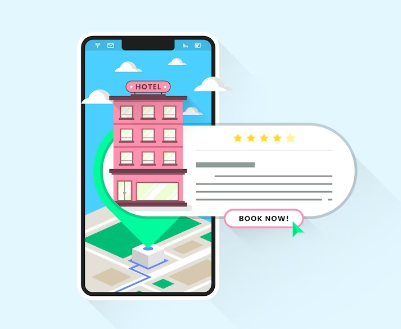
Local citations are like online shout-outs from other websites that mention your hotel’s name, address, and phone number.
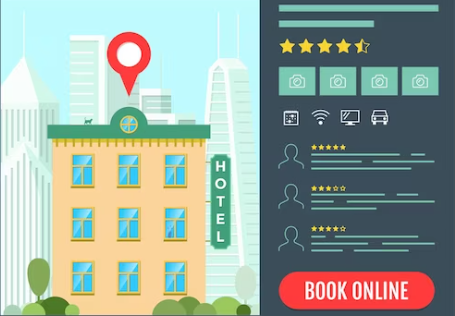
To get more of these, start by adding your hotel to popular local directories and websites like Yelp, TripAdvisor, and Google My Business.
Make sure your information is always accurate and up-to-date so people can find you easily.
You can use automated paid services like Brightlocal to make sure this information is always accurate.

Backlinks are like digital high-fives from other websites that link to your hotel’s website.
They tell search engines like Google that your hotel is important and worth visiting. You’ll hear this most often when you hear about off-page SEO, and it’s as relevant today as ever.

To get more backlinks, try reaching out to local businesses, attractions, and event organizers to see if they can mention your hotel on their websites.
You can also write guest blog posts for other websites or share your hotel’s story with local news outlets.
This all comes down to reaching out and trying to form a connection. Send out emails, talk to guests and network with colleagues and hotel partners and competitors alike.
By building local citations and backlinks, you’ll create a network of connections that can help your hotel become more popular online.
This will make it easier for people to find you in search results, which means more guests and a more successful business.
So, start making new friends and watch your hotel’s online presence grow!
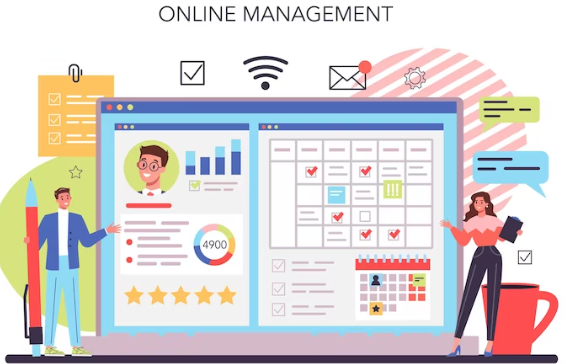
It takes effort to be the most popular kid on the block and this is akin to making sure your hotel has a good reputation online.
When people like your hotel and say nice things about it, more people will want to stay there.
In this section, we’ll learn about Online Reputation Management and how to keep track of what people are saying about your hotel online.
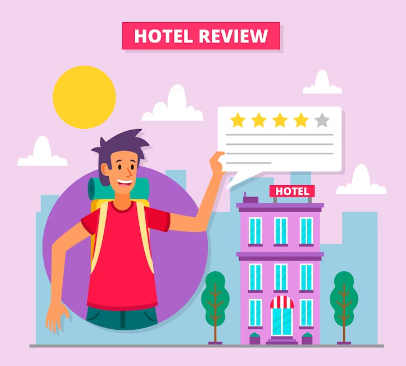
This is the first, and most important point, of online reputation management.
Many businesses forget to encourage hotel guests to leave a review, even though most guests would be happy to when reminded.
Let’s face it though, this isn’t the most important thing for guests to remember, unless they had a particularly bad experience (which you should proactively try to address to head those off)!
Try to include a call to action for guests to give feedback about their stay. You could tie these into incentives or other hotel concessions.
If the guest has a positive review, then you can follow-up by encouraging them to leave reviews on other online listings like your Google listing or hotel review websites.
You can also get a guest’s email to send them special promotions and ask them about their stay at a later time.

It’s important to know what guests are saying about your hotel so you can make it even better. Use tools to track reviews across various platforms and set up alerts on them.
There are special tools on the internet that can help you find and read reviews from different websites like Google, TripAdvisor, and Yelp all in one place.
Google has some of these tools integrated into its platform, but you can also utilize third party services like ReviewTrackers.
You also want to be sure to monitor your reviews on the most popular hotel reservation platforms like Agoda and Hotels.com.

It’s not enough to just monitor your reviews. You want to send signals that you’re engaged with your business and respond to reviews.
This is more than just giving a good impression to patrons (but that’s a big factor!) it’s also about giving Google and other search engines that you’re an active business listing.
This tells them they should rank you in organic search results as such.

This should go without saying, but you should respond to all reviews in a positive and professional manner.
Nothing screams “red flag” to potential guests like getting into an argument with a reviewer about their feedback.
Even if the feedback is unfair or untrue, think about it from a casual observers perspective. You’re a big business picking a fight with an average customer.
If there’s something you think is inaccurate then try to address it and give context to those who will be reading this reply for year’s to come.
Always offer solutions and thank guests for their feedback.

Your social media account is your own show personal show.
It helps you connect with guests, share exciting news, and show off your hotel’s personality.
This sets you apart from the competition and can generate buzz amongst people wanting to be a part of your show.
In this section, we’ll learn about using social media for Local SEO to make your hotel more popular online.
To become a star, you need to be part of the conversation in your town or city. There are a few ways to do this:
Talk about exciting things happening in your area, like festivals, concerts, or sports games.
This will show people that your hotel is part of the community and can be a great place to stay when they visit.
Team up with nearby shops, restaurants, and popular people on social media to create fun events or promotions. This can help your hotel become even more well-known in your area.
Being a star means listening to your fans and talking to them. Here are some ways to do this on social media:
Pay attention to what people are saying about your hotel on social media. If they have questions or concerns, make sure to answer them quickly and kindly.
Show people that your hotel cares about its guests by responding to comments and messages in a friendly, helpful way.
By using social media for Local SEO, you’ll create a strong online presence for your hotel and connect with your community.
This can help more people find your hotel, which means more guests and a more successful hotel business. So, start sharing, collaborating, and engaging with your fans.
The race for success means knowing how well you’re doing and thinking of new ways to improve and win.
Measuring success and adapting strategies to make your hotel’s online presence even better is a key element in building a successful hotel website.
To know how well your hotel is doing online, you need to look at the numbers.
Keep an eye on where your hotel shows up in search results and how many people visit your website.
This can help you understand if your strategies are working or if you need to make changes.
Look at how your efforts to manage guest reviews are affecting your hotel’s reputation.
Are you getting more positive reviews? Are there fewer complaints?
This can help you see if your hard work is paying off.
Winning the online game means always staying one step ahead. That means iterating and improving to changing circumstances. To do that, requires knowledge.
Learn about new ways to improve your hotel’s online presence and make sure you’re always using the latest tips and tricks.
Listen to what your guests are saying and use their feedback to make your hotel even better.
If people are happy with one part of your hotel, do more of it. If they’re not, find out why and fix it.
It’s a lot to wrap your head around, so let’s recap:
Use local SEO to make your hotel easy to find. To do so, you need to use relevant keywords, build connections with other websites with off-page SEO, and be a part of your community. This helps your hotel show up higher in search results when people look for a place to stay in your area.
Utilize proper online reputation management to make sure people say nice things about your hotel. To do this, you need to keep track of guest reviews and ratings, respond to them, and use the feedback to make your hotel even better. This helps create a strong online reputation, which makes more people want to stay at your hotel.
Don’t neglect Social Media! To connect with your community and show off your hotel’s personality, you need to be active on social media. Share local events, collaborate with nearby businesses, and engage with your fans to make your hotel the star of the show.
Always measure success and adapt your strategies. To top local seo for hotels results, you need to know how well your hotel listing is doing and how to change your moves to beat the competition.
Use special tools to track your performance, stay up-to-date with the latest tips and tricks, and adjust your strategies based on customer feedback.
By focusing on local SEO for hotels and online reputation management, you’ll build an amazing online presence for your hotel that attracts more guests and leads to a successful hotel business.
Make sure your in-house staff has the tools they need, or partner with an experienced hotel marketing agency that can give you local SEO success.
What are you waiting for? Start building your ultimate hotel website and watch your popularity soar!
We're here to help our hotel partners take back control of their sales channels - we’re
happy to discuss your requirements and explore how we can increase your revenue.